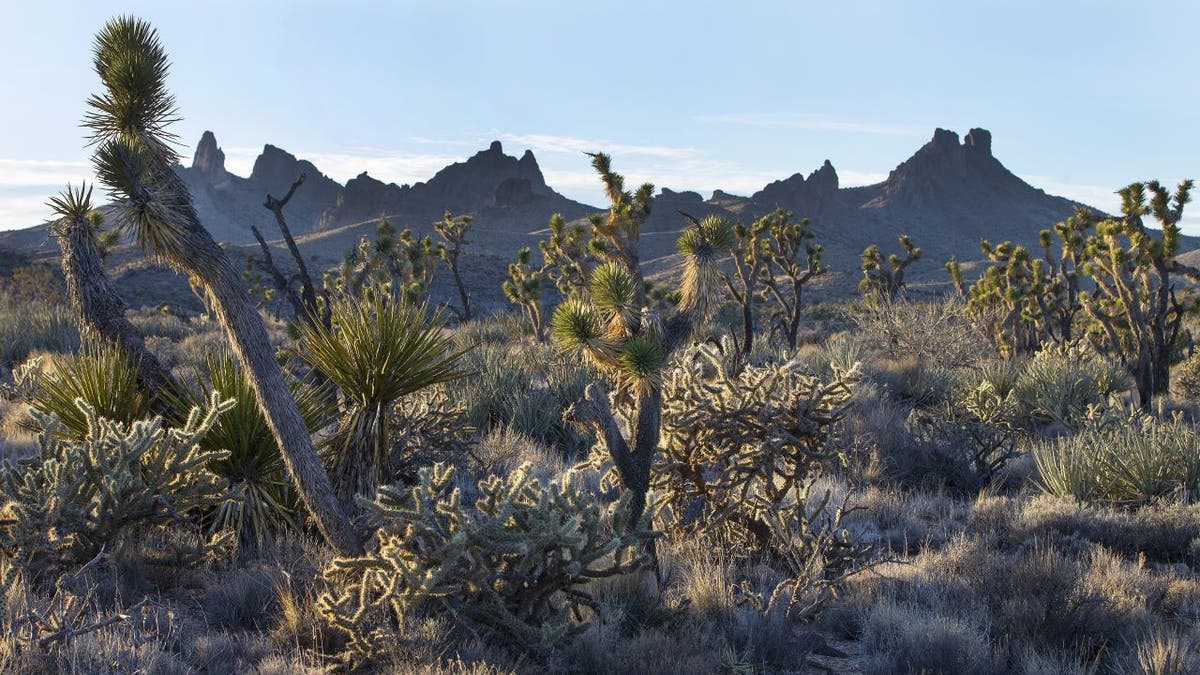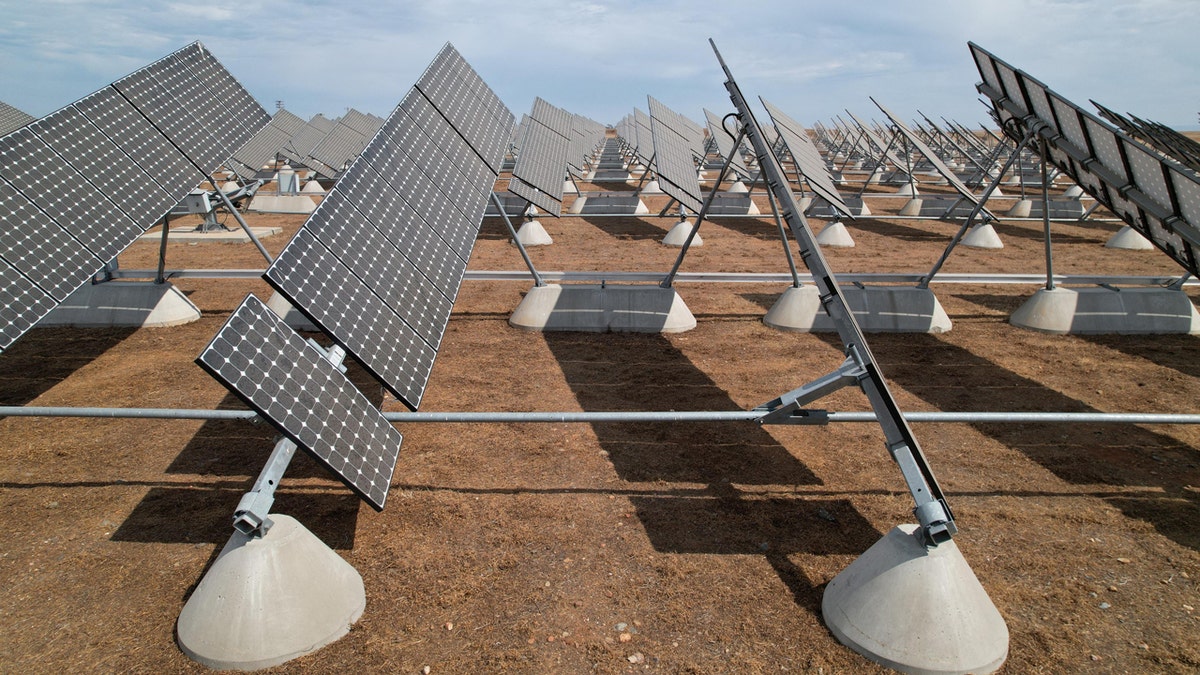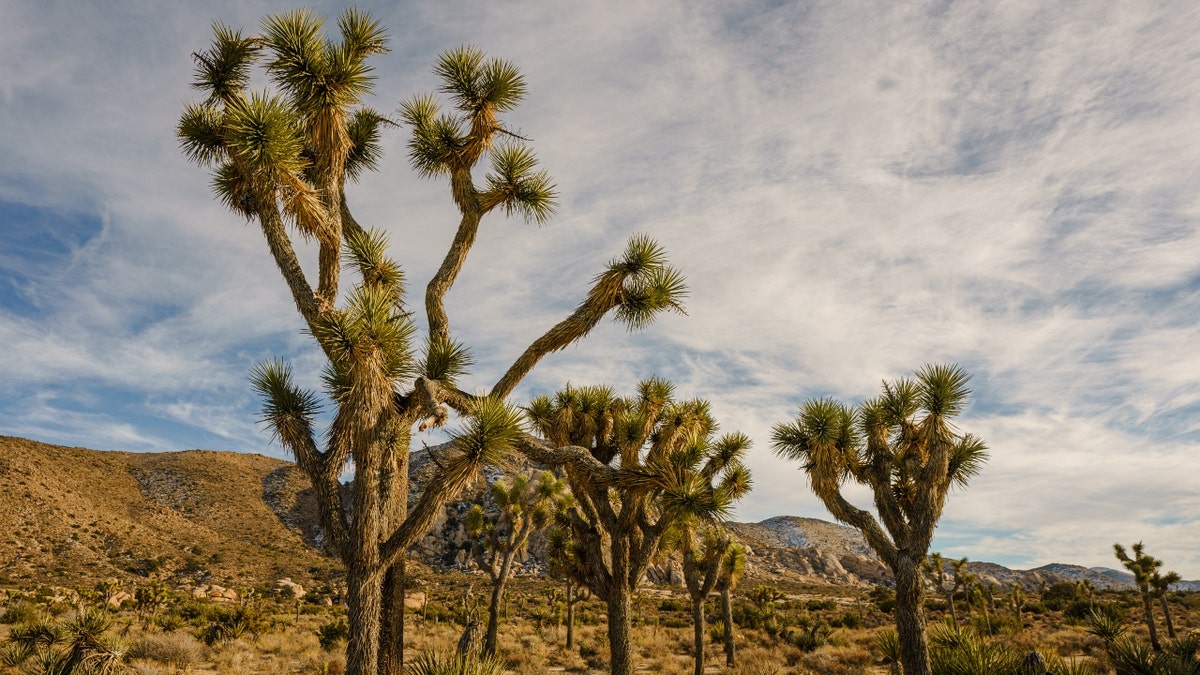Biden’s ‘massively increased spending’ for green energy: Steve Moore
Former Obama economic adviser Robert Wolf and former Trump campaign economic adviser Steve Moore join ‘America Reports’ to discuss rising energy costs and President Biden’s green energy push.
A California-based renewable energy company plans to clear thousands of protected Joshua trees in the Mojave Desert to make way for a solar project that will generate electricity for nearly 180,000 homes in coastal neighborhoods instead of the impacted communities, according to reports.
The Los Angeles Times reported that the company, Avantus, is planning to build the Aratina Solar Project on 2,300 acres near Boron and Desert Lake, California, two towns in Kern County.
Residents of the poverty-stricken towns are angered by the project, not just because of the construction dust, but also because the land where the solar facility will be located is home to endangered desert tortoises.
The residents’ concerns reportedly were ignored by county officials, who unanimously approved the project.
US ENERGY FUTURE 'UNDER THREAT' FROM BIDEN POLICIES: GOP REPORT

Native grasslands mingle with Joshua trees in the Mojave Desert landscape. (Gina Ferazzi /Los Angeles Times via Getty Images)
"Let’s destroy the environment to save the environment. That seems to be the mentality," Deric English, a teacher at Boron Junior-Senior High School told the LA Times. "It’s hard to comprehend."
California’s efforts to establish and generate clean energy are surrounded by controversy, as is the case with the Aratina project, which highlights the trade-offs state and local officials are willing to make in their quest.
In order to develop solar and wind fields that will be used to cut back on greenhouse gases and slow down climate change, projects like Aratina involve the destruction of undeveloped land and harming wildlife and endangered plants.
BIDEN'S ‘WAR’ ON ENERGY WILL COST AMERICANS JOBS, WORSEN INFLATION, MONTANA OFFICIALS SAY

Solar panels are set up in the solar farm at the University of California, Merced, in Merced, California, on August 17, 2022. (REUTERS/Nathan Frandino/File Photo)
The projects also affect nearby small communities, which lack the political power to stop such projects.
The Times spoke to a person briefed on the project, who reportedly declined to be named because they were not at liberty to discuss the Aratina project.
The person told the publication that crews are scheduled to begin clearing the Aratina Project site, which includes Joshua trees, on Monday.
FLOATING WIND TURBINE IN MAINE PROVES RESILIENT IN STORM SIMULATION, RESEARCHERS SAY

A solar project in Boron, California threatens more than 3,500 Joshua trees, which are expected to be cleared. ((Photo by Josh Brasted/Getty Images))
In order to reduce the visibility of tree clearing, crews will have machinery on location to shred the trees instead of putting them in piles or loading them onto trucks and driving them out.
Fox News Digital reached out to Kern County for comment on the project and did not immediately hear back.
Still, the company addresses how the project will impact Joshua trees in the area, on its website.
"Avantus is working to preserve native Mojave plants like Joshua Trees while also preserving California’s ability to achieve its clean energy goals – and the economic and climate benefits that come with them," the company said. "While trees will be impacted during project construction, vastly more Joshua Trees are being threatened by climate change caused by rising greenhouse gas emissions, which the Aratina solar project directly addresses."
Avantus told Fox News Digital the Aratina Solar Center will generate clean, reliable electricity to help California meet its clean energy goals and also fight rising temperatures threatening species and ecosystems across the state.
The company said the solar center has been under development in Kern County for several years, and the plans were adjusted based on community feedback in an effort to be good neighbors and good stewards.
CA REGULATORS TO VOTE ON DIVISIVE ENERGY BILL PROPOSAL

A solar project is expected to be erected on a 2,300-acre parcel in Boron, California, threatening turtles and Joshua trees. (Sholten Singer/The Herald-Dispatch via AP, File)
In May, Avantus and local contractors started to prepare the site, and the company says they will soon begin "selectively clearing the area of vegetation and other large natural obstacles," which have been approved for removal by county officials and the state department of fish and wildlife.
"Avantus takes care on all projects to minimize any unnecessary impacts such as noise, dust, or traffic throughout all phases of the project, including site preparation and construction," the company said. "Avantus is committed to being a good neighbor by partnering with local organizations to provide direct community benefits and create good-paying jobs."
In the environmental impact statement for the project, which is posted on the Kern County website, Avantus said about 4,700 Joshua trees were located on the site, with over 500 of the trees standing 16 feet tall.
A person familiar with the project told the LA Times the company plans to destroy 3,500 Joshua trees.
The company also addresses how Aratina will impact local wildlife, saying it has a "positive track record" with wildlife agencies and environmental organizations, and past projects were able to garner support from the Sierra Club, Audubon California, Defenders of Wildlife and the Natural Resources Defense Council.
"We design each project to avoid or minimize potential impacts to threatened or endangered species and ensure proper mitigation measures are provided as appropriate," the company said.
As to concerns about dust, the company claims it will use dust suppression to control and minimize potential impacts on construction workers and surrounding communities.
The Kern County Board of Supervisors approved the Aratina project in October 2021, and according to Alexander Sundquist, who to county officials before the decision was made, the project comes with $3 million in sales taxes and $73 million in property taxes.
County officials, the publication reported, claim Avantus put $1.4 million aside to protect Joshua trees in other areas across the state. It also reportedly purchased grazing rights on 215,000 acres of federal land in the county, including 80,000 acres of Western Joshua tree habitat, and plans to work with officials to preserve the land.
CLICK HERE TO GET THE FOX NEWS APP
As to where the electricity will be sent, the company has remained mum. But the Times said the company has signed contracts for some of the electricity to go to Silicon Valley Clean Energy and Central Coast Community Energy, both of which are nonprofits that provide green energy to homes.
California lawmakers, in 2023, approved the Western Joshua Tree Conservation Act, banning the killing of trees without a permit. The Aratina project, though, was approved by state officials before the Western Joshua Tree Conservation Act was approved, as well as before the state made the Joshua tree a candidate for protection under the state’s endangered species act.











































